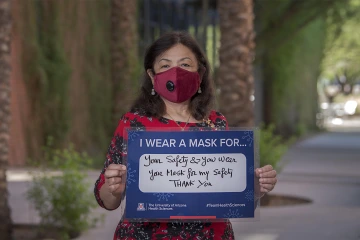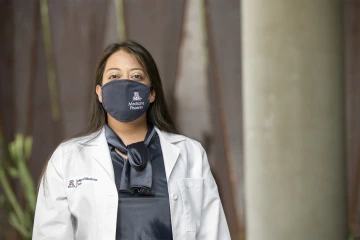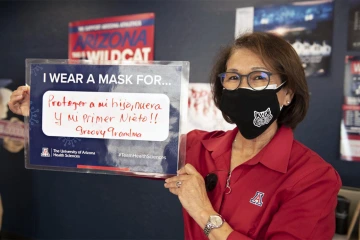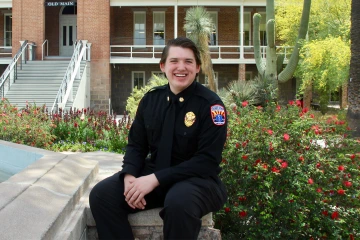Why Do You Wear Your Mask?
Health Sciences is leading by example, wearing masks and practicing public health protocols.
The University of Arizona Health Sciences has been a leader in developing precision health care for all, creating defenses against diseases and establishing new frontiers for better health. Over the past six months as the pandemic has spread, faculty, staff and students throughout Health Sciences also have embraced their roles as stewards of good public health.
On the campuses in Tucson and the Phoenix area, there’s a clear understanding that there’s only one way before a vaccine is available to eventually return to the collaborative, in-person activities we enjoyed before the pandemic: follow science-based public health directives to wear a mask, stay six feet apart, and monitor yourself for symptoms so you can isolate if needed.
Wearing a mask to protect others

Iman Hakim, MBBCh, PhD, MPH, dean of the Mel and Enid Zuckerman College of Public Health.
Over the past few days, our peers and colleagues have shared inspiring messages about why they are committed to leading by example in the Health Sciences Connect “I Wear A Mask” photo gallery.
“The ‘I Wear A Mask’ campaign is the embodiment of our public health mission – promote safety, prevent illness and protect each other. We know that if everyone wears masks and observes physical distance guidelines, the number of COVID-19 cases will drop dramatically,” said Iman Hakim, MD, PhD, MPH, dean of the Mel and Enid Zuckerman College of Public Health.
“As public health leaders, we need to model the best behaviors and inspire everyone in our community to follow the guidelines. If we build a culture of health promotion, we will save lives."
Elen Mendoza is a first-year student at the College of Medicine – Phoenix who hopes to practice family medicine in an underserved area in Arizona.
She and several members of her immediate family contracted the virus that causes COVID-19. Some felt ill, while others, including her, were asymptomatic. When Mendoza and her family received positive test results, “we quarantined because we knew it was the right thing to do,” she said.

Elen Mendoza wears her mask for a photo shoot on the Phoenix Biomedical Campus. Mendoza is a first year medical student at the College of Medicine – Phoenix.
She continues to lead by example.
“It’s super important to be cautious about where you’re going and taking as many precautions as possible. Wearing a mask is just one of them,” she said. “Wearing a mask is a sign that you are prioritizing other people’s health, and that’s why I choose to wear a mask.”
Others share this sense of responsibility to the public good, including Terry Urbine, PhD, a senior lecturer at the Mel and Enid Zuckerman College of Public Health in Phoenix.
“I’m contributing to the benefit of reducing the contagion of this disease, and I firmly believe if everybody did that, we wouldn’t be wearing masks today,” Dr. Urbine said.
He studies and teaches economics and public policy as they relate to health.
“Wearing a mask is something easy that I can do and everyone else can do to stop the spread.”

Cecelia Rosales, MD, MS, shares that the health and safety of her first newborn grandchild is one of her motivations for wearing a mask.
Cecelia Rosales, MD, MS, is interim associate dean for community engagement and outreach at the Mel and Enid Zuckerman College of Public Health, and professor and chair of the Department of Public Health Practice and Translational Research.
Dr. Rosales has been coming to work on the Phoenix Biomedical Campus throughout the pandemic to access internet and continue to work. She knows people who have been ill with the virus that causes COVID-19 and takes solace in seeing social change.
“What gives me hope is that I see others, the few others that are on campus and around the downtown area, wearing masks,” she said.
Training ambassadors of public health
Health leadership goes beyond wearing protective equipment, it is also about sharing what you know.
The Mel and Enid Zuckerman College of Public Health started a Health Promotion Ambassadors training to help disseminate information throughout the University of Arizona community.

Timothy Gustafson is a master's degree student at the College of Public Health focusing on industrial health. He is also the chief and executive director of the student-run UArizona Emergency Medical Services.
It is one of several UArizona initiatives with a similar goal of educating the community. The college trains students who are already leaders in a campus group to understand what the university is doing in response to COVID-19, to identify where university resources are available, and then to share that information with others.
Tim Gustafson is one of the graduate student leaders of the effort.
“As horrible as these times are, we're also fortunate that we get the chance to put the tools that we've learned in the classroom into place,” Gustafson said.
Health Promotion Ambassadors educate the campus community about university guidelines and Centers for Disease Control and Prevention protocols, he said. They answer questions from their peer groups, but they aren’t tasked with enforcement duties.
“The most rewarding part is I can use what I've learned as a public health undergraduate student, and now as a graduate student, to help my community.”
Photo Gallery: Health Sciences Leads and Inspires With “I Wear a Mask”

